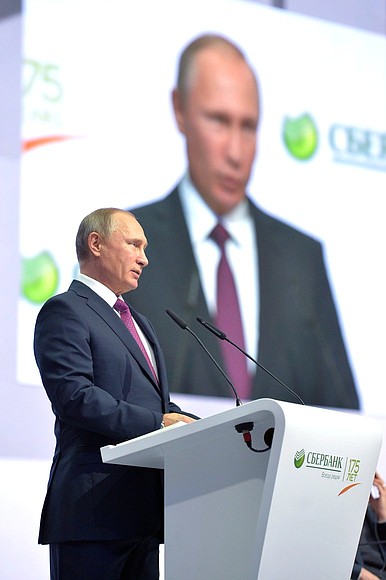Vladimir Putin took part in the international conference Into the Future: Russia’s Role and Place, organised by Russia’s oldest bank, Sberbank, to mark its 175th anniversary.
November 10, 2016
14:30
Moscow

Conference Into the Future: Russia’s Role and Place.
The conference focused on forecasting and analysing future technology trends, discussing the main outlines for technological development, and examining the potential benefits and risks their mass use could bring.
* * *
President of Russia Vladimir Putin: Good afternoon, friends,
Thank you very much for your welcome and applause.
We all share the holiday mood today as we mark the 175th anniversary of Sberbank, Russia’s oldest and biggest bank. This is a very solid age, even for a bank.
It is a pleasure to congratulate the bank’s workers and managers with this impressive anniversary and wish you all new success. You already have successes to your name, but I wish you new achievements.
As a leader in Russia’s financial sector, Sberbank is always moving forward, constantly improving its competitiveness, following modern trends and developments around the world closely, and placing its stakes on ongoing and rapid introduction of the latest technological and management innovations. It has plenty of advice to offer, including to the Russian Government. It is not by chance that the theme of this conference, which marks the bank’s anniversary, addresses the challenges and opportunities that scientific and innovation development bring our way.
The world has developed tremendous technological capability today, but there is no doubt that we are still not making full use of its potential. We see this reflected in the fact that recognised global economic power centres are failing to reach high and sustainable economic growth rates.
At the same time, the leading countries see innovation as an integral key component of this latest stage in global development and set their social and economic strategies in accordance.
For Russia, it is important to seize the key trends in technological progress and understand our strong points and weak points in the transition to the next-generation economy. Everyone present here today is well aware of this new economy’s main outlines. They include high mobility and convenience in provision of goods and services, that are available when and where you wish, at a simple click or touch of a telephone or tablet.
Digital technology is having an impact on all aspects of our society today. We see before our very eyes the changes digital technology is bringing to old and stable sectors such as healthcare, pharmaceuticals, energy, and to the urban environment and our lifestyles in general.
These global changes open the road to dramatic increases in labour productivity (this is something I discuss frequently at meetings with colleagues from the business community), and create unique opportunities to develop new market niches and obtain real advantages.
At the same time, this process does come with considerable risks too, above all for the countries that fail to ride the technology wave. Of course, this leaves them at risk of ending up on the margins of progress and becoming outsiders in the competitive struggle.
New technologies can also make traditional sectors less attractive, and changing demand for skills and automation of production processes, without the needed system for retraining human resources, can result in structural unemployment.
This is all comprehensible and elementary, things we know from back since when the industrial revolution began in England. We remember the social upheavals that took place, the strict sticking to the workplace rules as a means of striking, the people who destroyed new equipment and so on. It is an old problem that has not changed.
To be continued.